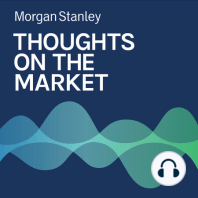3 min listen
Mike Wilson: A More Bearish View for 2022
ratings:
Length:
4 minutes
Released:
Mar 7, 2022
Format:
Podcast episode
Description
The year of the stock picker is in full swing as investors look towards a future of Fed tightening and geopolitical uncertainty, where some individual stocks will fare better than others.-----Transcript-----Welcome to Thoughts on the Market. I'm Mike Wilson, Chief Investment Officer and Chief U.S. Equity Strategist for Morgan Stanley. Along with my colleagues bringing you a variety of perspectives, I'll be talking about the latest trends in the financial marketplace. It's Monday, March 7th at 11:00 a.m. in New York. So let's get after it. Since publishing our 2022 outlook in November, we've taken a more bearish view of stocks for reasons that are now more appreciated, if not fully. First was the Fed's pivot last fall, something most suggested would be a small nuisance that stocks would easily navigate. Part of this complacency was understandable due to the fact that the Fed had never really administered tough medicine in the past 20 years. Furthermore, when things got rough in the markets, they often pivoted back - the proverbial Fed “Put”, or the safety net for markets. We argued this time was different, just like we argued back in April 2020 that this quantitative easing program was different than the one that followed the Great Financial Crisis, or GFC. In short, printing money after the GFC didn't lead to the inflation many predicted, because it was simply filling the holes created on bank and consumer balance sheets that were left over from the housing collapse. However, this time the money printing was used to massively expand the balance sheets of consumers and businesses, who would then spend it. We called it helicopter money at the time. In short, the primary difference between the post GFC Fed money printing and the one that followed the COVID lockdown, is that the money actually made it into the real economy this time and drove demand well above supply. This imbalance is what triggered the Fed to pivot so aggressively on policy. In fact, Chair Powell has admitted that one of the Fed's miscalculations was thinking supply, including labor, would be able to adjust to the higher levels of demand making this inflation transitory. This has not been the case, and now the Fed must be resolute in its determination to reduce money supply growth. Nowhere was this resolve more clear than during Chair Powell's congressional testimony last week, when he was asked if he would be willing to take draconian steps, as Paul Volcker did in the early 1980s to fight inflation. Powell confidently answered, "Yes". To us this suggests the Fed "Put" on stocks is well below current levels, and investors should consider this when pricing risk assets. The other reason most investors and strategists have remained more bullish than us is due to the path of earnings. So far, this positive view has been correct. Earnings have come through, and it's the primary reason why the S&P 500 has held up better than the average stock. Therefore, the key question continues to be whether earnings growth can continue to offset the valuation compression that is now in full swing. We think it can for some individual stocks, which is why the title of our outlook was the year of the stock picker. As regular listeners know, we have been focused on factors like earnings, stability and operational efficiency when looking for stocks to own. Growth stocks might be able to do a little better as earnings take center stage from interest rates, but only if the valuations have come down far enough and they can really deliver on growth that meets the still high expectations. The bottom line is that the terribly unfortunate events in Ukraine make an already deteriorating situation worse. If we achieve some kind of cease fire or settlement that both Russia and the West can live with, equity markets are likely to rally sharply. We would use such rallies to lighten up on equity positions, however, especially those that are vulnerable to the earnings disappointment we were expectin
Released:
Mar 7, 2022
Format:
Podcast episode
Titles in the series (100)
Andrew Sheets: For Markets, Signs, Signs, Everywhere Signs by Thoughts on the Market
